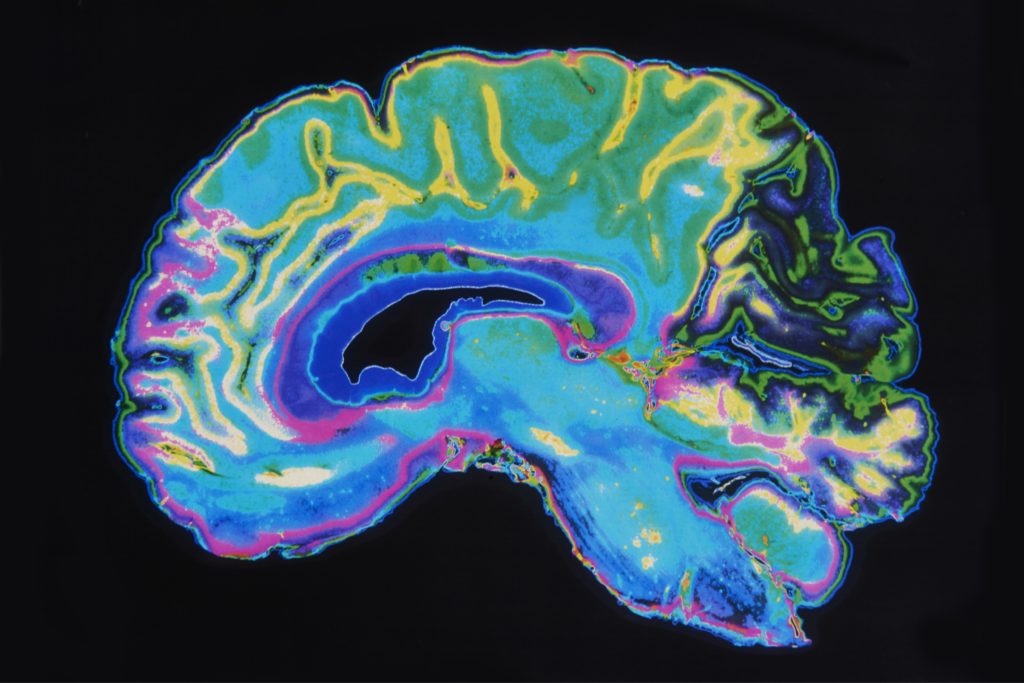Quick Hits
Daily brief research updates from the cognitive sciences

Teenagers’ brains are different – as many parents of teenagers notice quite intensely!
Adolescence is a critical period – we all know that. And the brain also goes through a number of changes, some of them well documented and others not. Adolescence is also a time when major mental illnesses such as depression and schizophrenia emerge but it also when risk-taking behaviour peaks.
Researchers at the University of Pittsburgh have now found compelling evidence of how this happens.
To do this the researchers around Maria Perica zoomed in on the prefrontal cortex of the brain. This region of the brain, at the front, your forehead, is considered the executive centre of the brain. The part that exerts control over other parts but also coordinates and consolidates lots of information. It is also an area involved heavily in decision-making.
Perica et al., used advanced imaging that gives double the resolution of normal imaging and compared the balance of two neurotransmitters in the fontal cortex of 144 adolescent and adult participants.
They specifically focused on the two main transmitters Glutamate and GABA. Glutamate is the brain’s man excitatory transmitter triggering action but also therefore involved in brain plasticity, triggering growth of the brain. GABA is the brain’s primary inhibitory transmitter, dampening and inhibiting transmission in the brain (also an essential function).
What did the researchers find?
They saw that the balance of glutamate increased through childhood and into adolescence before levelling off as adulthood approaches.
This suggest that this is putting the brain into a period of increased excitation and increased plasticity – the brain is at a stage of being able to sculpt and reform and also focus on things it may need in adulthood. This is also why exploratory but also risky behaviour increase at this time. Which as parents of teenagers know can also be challenging to deal with. But this is just nature preparing itself for adulthood.
There are also large risks such as the above-mentioned increased risk of mental illness.
This once again shows that teenagers behaviours are not just some strange psychological phenomenon but driven by a biological critical period of brain reorganisation – sometimes for the worse but mostly for the good.

Andy Habermacher
Andy is author of leading brains Review, Neuroleadership, and multiple other books. He has been intensively involved in writing and research into neuroleadership and is considered one of Europe’s leading experts. He is also a well-known public speaker, speaking on the brain and human behaviour.
Andy is also a masters athlete (middle distance running) and competes regularly at international competitions (and holds a few national records in his age category).
References
Maria I. Perica, Finnegan J. Calabro, Bart Larsen, Will Foran, Victor E. Yushmanov, Hoby Hetherington, Brenden Tervo-Clemmens, Chan-Hong Moon, Beatriz Luna.
Development of frontal GABA and glutamate supports excitation/inhibition balance from adolescence into adulthood.
Progress in Neurobiology, 2022; 219: 102370
DOI: 10.1016/j.pneurobio.2022.102370
More Quick Hits
Why Heat Makes Us Sleepy
Imagine if you are working and your stress levels are increasing, and then automatically soothing music is turned on to calm you down. Or alternatively if you are heading towards that after lunch dip of drowsiness and upbeat energetic music is turned on to energise you.
Tracking Mental States Through Your Skin – In Real Time
Imagine if you are working and your stress levels are increasing, and then automatically soothing music is turned on to calm you down. Or alternatively if you are heading towards that after lunch dip of drowsiness and upbeat energetic music is turned on to energise you.
Testosterone Promotes Cuddling
Quick HitsDaily brief research updates from the cognitive sciences es, you read the headline correctly. Testosterone considered the ultimate male hormone and often associated with aggression has had a bad rap. So, is all of this wrong? Well, the...
Online Learning Triggers Different Stress Responses
Quick HitsDaily brief research updates from the cognitive sciences ot so long ago all learning went online – out of necessity. There has been plenty pf research into differences in online learning and in-person learning but this study by Gellisch...
Use It Or Lose It – Mental Activity Reduces Dementia
Quick HitsDaily brief research updates from the cognitive sciences regularly write on which activities reduce risks of cognitive decline (just last week I reported on how your job can protect your mental abilites with age and also doing household...
Why Thinking Makes You Tired
Quick HitsDaily brief research updates from the cognitive sciences e all know that feeling of having engaged in hard cognitive, thinking, tasks, and feeling tired. If it goes on long enough, we may feel mentally fatigued, drained, or even...






